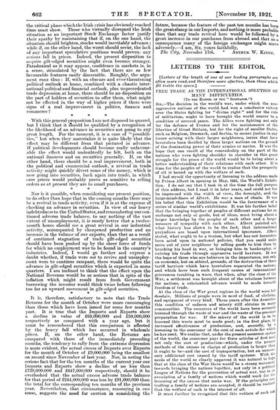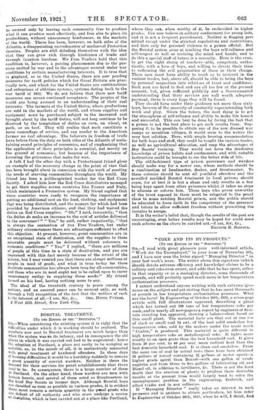LETTERS TO THE EDITOR.
[Letters- of- the- length of one of our leading paragraphs are often more read,and therefore'more effective, than those which fill treble the space.]
FREE TRADE AS THE INTERNATIONAL SOLUTION OF MANY DIFFICULTIES:
(To' THE EDITOR OY THE "•Sescriroa."I
Sie„—The decision in the world's war, under which the. non- aggressive nations of the world: had won a conclusive victory over the• States fighting for "divine right" and for the rule of militarism, ought to have brought the world nearer to a condition of assured, peace. The Allies. were fighting not only for the defence of Prance and for the maintenance of the liberties of Great Britain, but for the right of smaller States,
such as Belgium, Denmark, and Serbia, to secure justice in any issues arising with. their larger neighbours, issues that have heretofore been decided by those larger nations on the ground of the dominating power of their armies or navies. It was the hope that one result of the comradeship on the part of the nations who were fighting shoulder to shoulder in this great struggle for the peace of the world would be to bring about a better understanding of their relations with each other. It is time for the peoples of the world to realize that the prosperity of all is bound- up' with the welfare of each.
I had myself the opportunity of listening to the address made by Prince Albert in opening in May, 1851, the World's Exhibi- tion. I do -not say that I took in at the time the full purpose of this• address, but I read it in later years, and could not but be impressed with the width of view, the foresight, and- the large-mindedness of Albert. Ile was a man of ideals. It was his belief that this Exhibition. would be the forerunner of a series of similar world's exhibitions. It was his further belief that the bringing together of peoples of different nations for an exchange not only of goods, but of ideas, must bring about a larger knowledge by, the peoples of each other and a larger measure of sympathy with each other. Albert pointed' out, what history has shown to be the fact, that international prejudices are based upon international ignorance. Albert stated, what ought to be a truism, but' what has-not heretofore been acted upon in national policies, that you • could make more out of your neighbour by selling goods to hini than by breaking his head in war, or bringing him. to bankruptcy, or ruining his trade• through oppressive tariff barriers. It: Was the-hope-of those who are believers in the importance, not only on economic, but GII ethical, grounds, of the destruction of those tariff. barriers which have heretofore separated the nations, and. which have been such frequent causes of international grievances resulting in wars; that when, after the close of the War, a settlement was brought about of the relations between the nations, a. substantial advance would be made towards freedom of trade.
At the close of the War great regions• in the world' were left desolate. Millions of people were in need of food, of clothing, and equipment of_every ldnct. Three years after the Armistice this condition of sadness and misery- still obtains in roan! communities. The- resources of the world have been seriously lessened through the waste of war' and thewaste of the-previous preparation for war. If the, misery of the world' is. to be lessened this waste must be made good'; in the first place, by increased effectiveness of production, and, secondly; by 3 lessening to the consumer of the. costof each artiole.for which he has need. Werealize that, under thepresent economic system of: the world, the consumer pays for these articles. of first need not only, the cost of production—which, under the present methods of the. unions in charge of production is larger can it ought to be—and the cost of transportation, but an unneces- sary additional cost caused by the tariff systems: With the needs of the world so clearly apparent it was natural- to bogs that at the close of the War there would'be a strong movement towards bringing the nations together, not only in a political League of Nations for the prevention of actual war; but in an association of a family of nations which• would work for the lessening-of the causes• that make war. If the- principles eon trolling a family of nations- are accepted, it should- be realized that the welfivre of' each is the interest of alt.
It must further be recognized that this welfare of each en1 be secured only by leaving each community free to produce
hat it can produce most effectively, and free also to place its productions, without unnecessary hindrances, in the markets of the world. There has been, however, on both sides of the Atlantic, a disappointing recrudescence of mediaeval Protection theories. Peoples are still deluding themselves with the idea that they can grow rich through hindrance of trade and through taxation burdens. We Free Traders hold that this condition is, however, a passing phenomenon due to the pas- sions excited by war and to the advantages secured under war conditions by certain manufacturing interests. It is true that in jngland, as in the United States, there are now pending measures for tariff policies which for Great Britain are prac- tically new, and which for the United States are continuations and extensions of old-time systems, systems dating back to the war tariff of 1862. We do not believe that these new tariff measures can secure continued acceptance. The peoples of the world are being aroused to an understanding of their real interests. The farmers of the United States, whose productions are sold in the markets of the world, and whose supplies and equipment must be purchased subject to the increased cost brought about by the tariff duties, will not long continue to be deceived by the temptation of duties on corn, on wheat, on pork, or on beef. They will realize that such constitute a mere camouflage of service, and can render to the American farmer no real advantage. Tho believers in freedom of trade have before them the duty on both sides of the Atlantic of main- taining eound principles of economics, and of emphasizing that the application of these principles is essential, not merely on the ground of economics, but -because of the importance of lessening the grievances that make for war.
A talk I had the other day with a Protectionist friend gives an example of the necessary change in the point of view that has been brought about in connexion with the work of meeting the needs of starving communities throughout the world. My friend has been a public-spirited worker for the Red Cross Society. I asked him how the Red Cross distributors managed to get their supplies across .countries like France and Italy, which maintained a Protective system. My friend replied that these countries were ready to recognize the importance of putting no additional cost on the food, clothing, and equipment that was being distributed, and the menus for which had been provided by American citizens, and that they had waived the duties on Red Cross supplies. "'0h;" I said, innocently, "then the duties do make an increase in the •cost of articles delivered to the consumer?" " Yes," he said, rather impatiently, "that is always the contention of you Free Traders, but under ordinary circumstances there are advantages sufficient to offset this objection. At present, however, great communities are in an exceptional state of destitution, and the supplies to these miserable people must be delivered without reference to economic conditions." " Yes," I replied, " there are millions of people at this time in a state of destitution, and you are impressed with this fact merely because of the extent of the misery, bat I may remind you that there are always millions of people in need of goods, and what is true to-day for these destitute communities has always been true for all communities, and those who are in need ought not to be called upon to incur unnecessary outlay in -supplying these needs." My friend turned on his -heel, having nothing more to say.
The ideal of the twentieth century is peace among the nations, and an assured peace can be secured only, as said, through a full recognition of the fact that the welfare of each h the interest of all.—I am, Sir, &c., Geo. HAVEN PUTNAM. I West 45th Street, New York City.







































 Previous page
Previous page